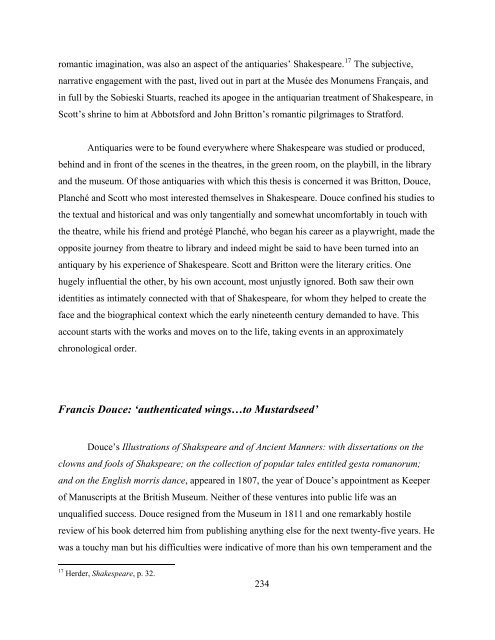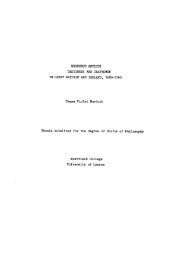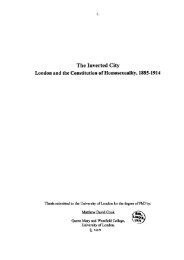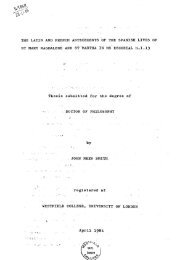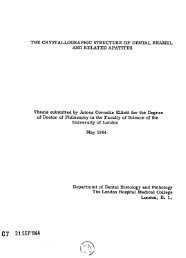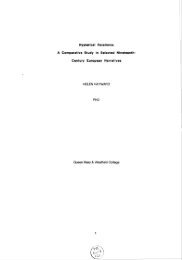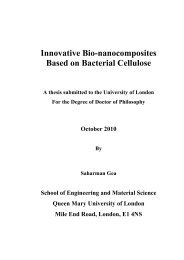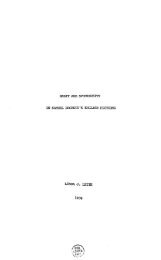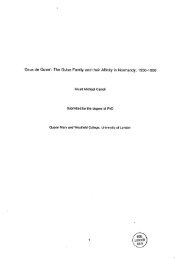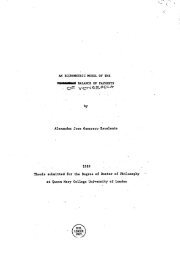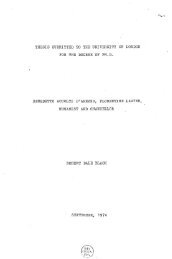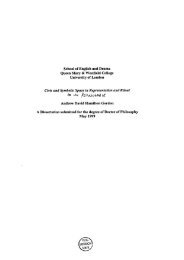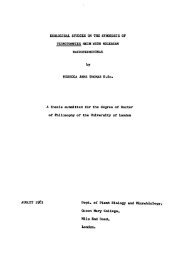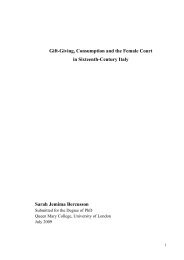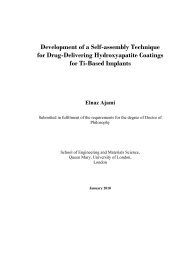Antiquaries in the Age of Romanticism: 1789-1851 - Queen Mary ...
Antiquaries in the Age of Romanticism: 1789-1851 - Queen Mary ...
Antiquaries in the Age of Romanticism: 1789-1851 - Queen Mary ...
Create successful ePaper yourself
Turn your PDF publications into a flip-book with our unique Google optimized e-Paper software.
omantic imag<strong>in</strong>ation, was also an aspect <strong>of</strong> <strong>the</strong> antiquaries’ Shakespeare. 17 The subjective,<br />
narrative engagement with <strong>the</strong> past, lived out <strong>in</strong> part at <strong>the</strong> Musée des Monumens Français, and<br />
<strong>in</strong> full by <strong>the</strong> Sobieski Stuarts, reached its apogee <strong>in</strong> <strong>the</strong> antiquarian treatment <strong>of</strong> Shakespeare, <strong>in</strong><br />
Scott’s shr<strong>in</strong>e to him at Abbotsford and John Britton’s romantic pilgrimages to Stratford.<br />
<strong>Antiquaries</strong> were to be found everywhere where Shakespeare was studied or produced,<br />
beh<strong>in</strong>d and <strong>in</strong> front <strong>of</strong> <strong>the</strong> scenes <strong>in</strong> <strong>the</strong> <strong>the</strong>atres, <strong>in</strong> <strong>the</strong> green room, on <strong>the</strong> playbill, <strong>in</strong> <strong>the</strong> library<br />
and <strong>the</strong> museum. Of those antiquaries with which this <strong>the</strong>sis is concerned it was Britton, Douce,<br />
Planché and Scott who most <strong>in</strong>terested <strong>the</strong>mselves <strong>in</strong> Shakespeare. Douce conf<strong>in</strong>ed his studies to<br />
<strong>the</strong> textual and historical and was only tangentially and somewhat uncomfortably <strong>in</strong> touch with<br />
<strong>the</strong> <strong>the</strong>atre, while his friend and protégé Planché, who began his career as a playwright, made <strong>the</strong><br />
opposite journey from <strong>the</strong>atre to library and <strong>in</strong>deed might be said to have been turned <strong>in</strong>to an<br />
antiquary by his experience <strong>of</strong> Shakespeare. Scott and Britton were <strong>the</strong> literary critics. One<br />
hugely <strong>in</strong>fluential <strong>the</strong> o<strong>the</strong>r, by his own account, most unjustly ignored. Both saw <strong>the</strong>ir own<br />
identities as <strong>in</strong>timately connected with that <strong>of</strong> Shakespeare, for whom <strong>the</strong>y helped to create <strong>the</strong><br />
face and <strong>the</strong> biographical context which <strong>the</strong> early n<strong>in</strong>eteenth century demanded to have. This<br />
account starts with <strong>the</strong> works and moves on to <strong>the</strong> life, tak<strong>in</strong>g events <strong>in</strong> an approximately<br />
chronological order.<br />
Francis Douce: ‘au<strong>the</strong>nticated w<strong>in</strong>gs…to Mustardseed’<br />
Douce’s Illustrations <strong>of</strong> Shakspeare and <strong>of</strong> Ancient Manners: with dissertations on <strong>the</strong><br />
clowns and fools <strong>of</strong> Shakspeare; on <strong>the</strong> collection <strong>of</strong> popular tales entitled gesta romanorum;<br />
and on <strong>the</strong> English morris dance, appeared <strong>in</strong> 1807, <strong>the</strong> year <strong>of</strong> Douce’s appo<strong>in</strong>tment as Keeper<br />
<strong>of</strong> Manuscripts at <strong>the</strong> British Museum. Nei<strong>the</strong>r <strong>of</strong> <strong>the</strong>se ventures <strong>in</strong>to public life was an<br />
unqualified success. Douce resigned from <strong>the</strong> Museum <strong>in</strong> 1811 and one remarkably hostile<br />
review <strong>of</strong> his book deterred him from publish<strong>in</strong>g anyth<strong>in</strong>g else for <strong>the</strong> next twenty-five years. He<br />
was a touchy man but his difficulties were <strong>in</strong>dicative <strong>of</strong> more than his own temperament and <strong>the</strong><br />
17 Herder, Shakespeare, p. 32.<br />
234


